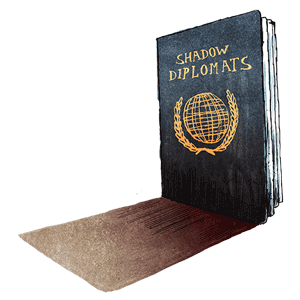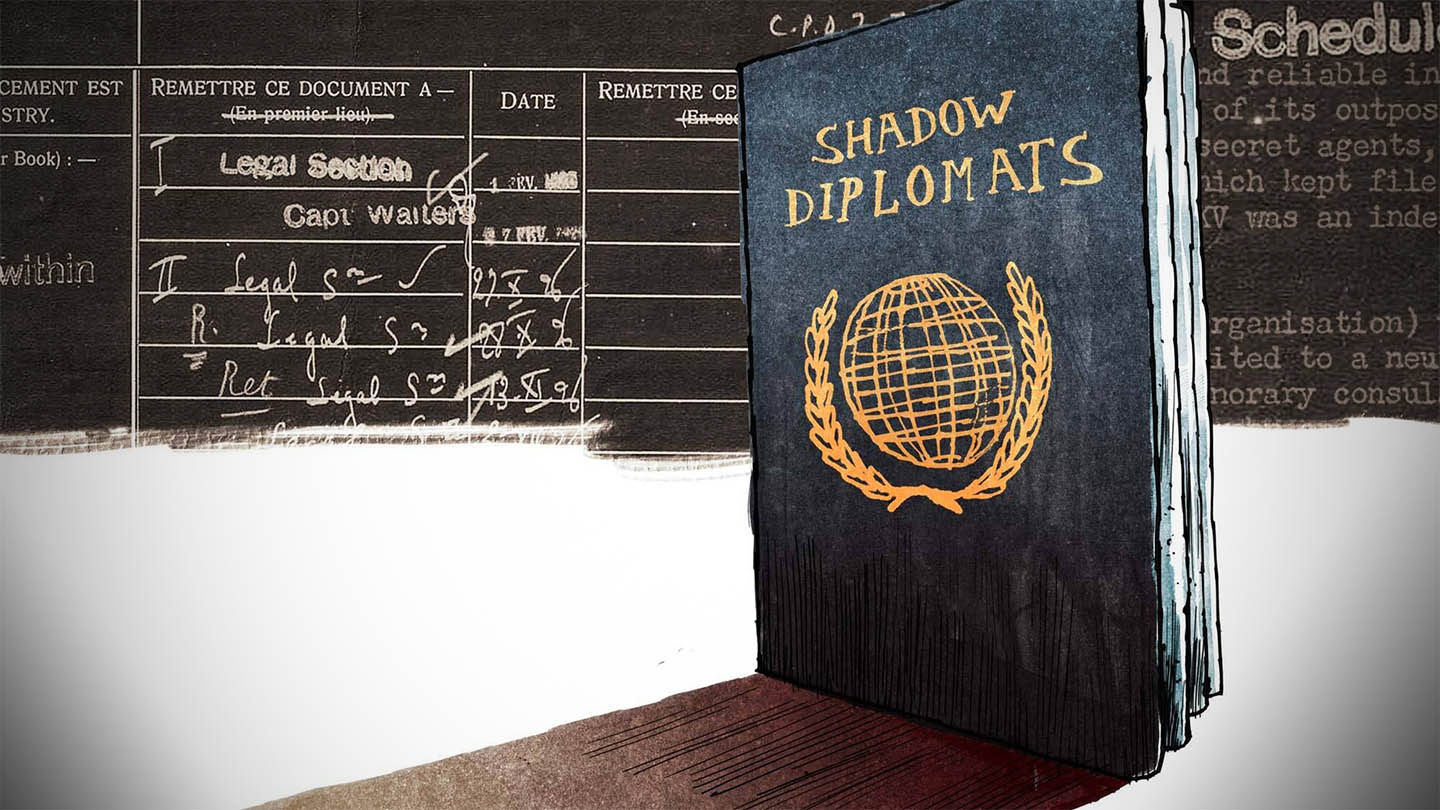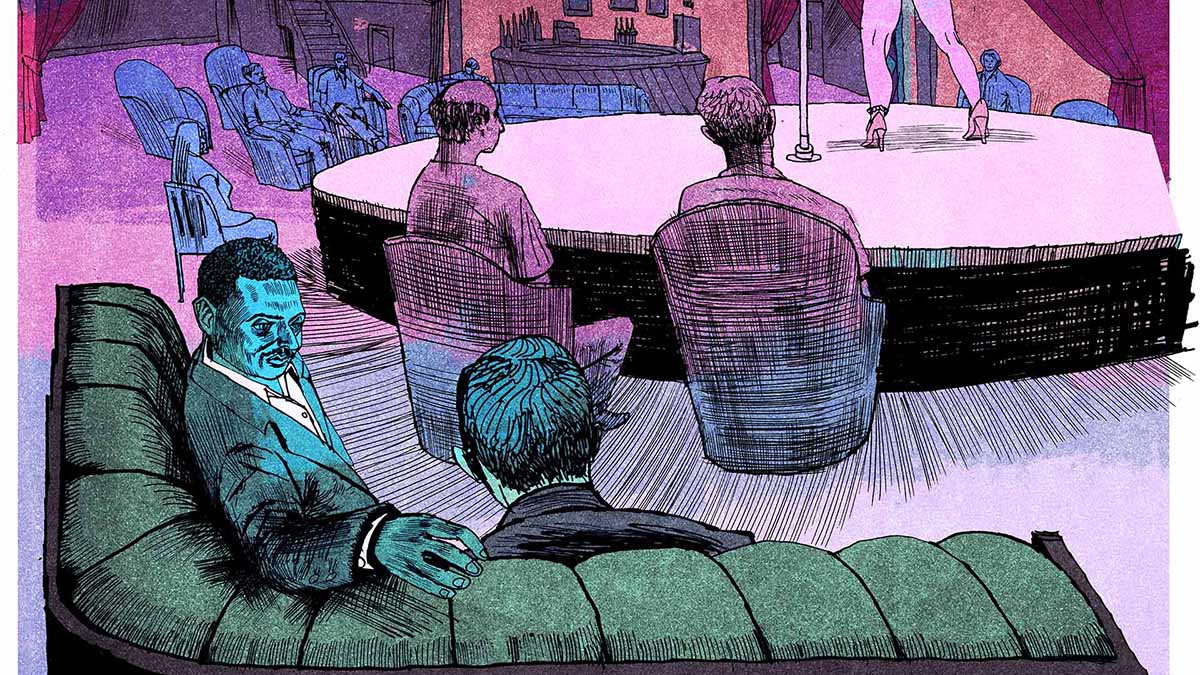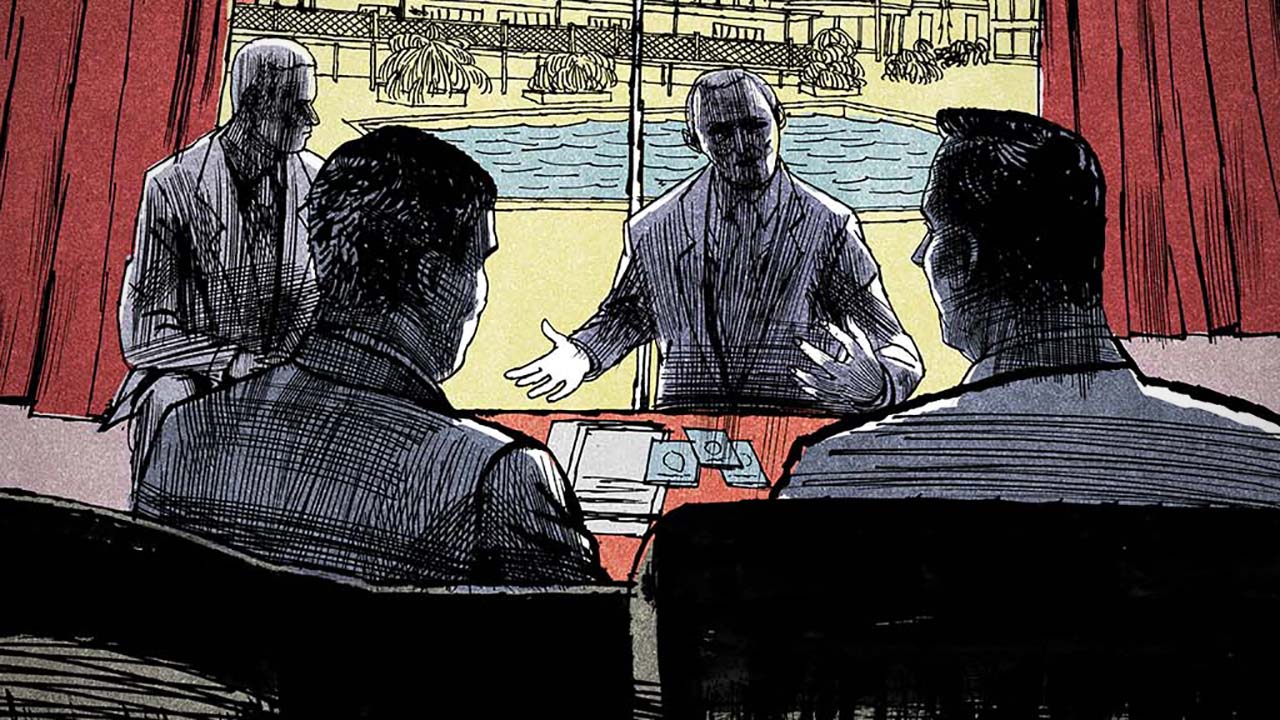MEET THE INVESTIGATORS
Meet the Investigators podcast: Exposing the Shadow Diplomats
Reporters Will Fitzgibbon, Debbie Cenziper and Diana Moukalled take us behind the scenes of the Shadow Diplomats investigation and reveal how ICIJ and its partners uncovered hundreds of part-time diplomats embroiled in controversy.
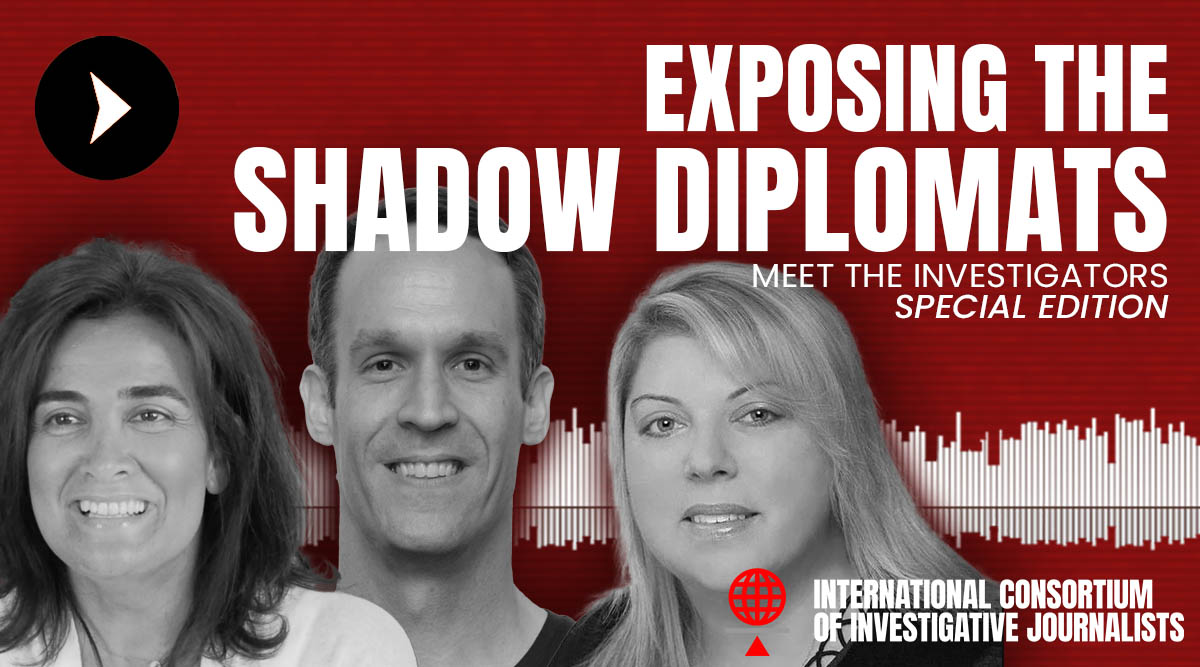
The International Consortium of Investigative Journalists collaborates with hundreds of members across the world. Each of these journalists is among the best in his or her country and many have won national and global awards. Our monthly series, Meet the Investigators, highlights the work of these tireless journalists.
In our final episode of 2022, ICIJ senior reporter Will Fitzgibbon, ProPublica investigative reporter Debbie Cenziper and Daraj Media managing editor and co-founder Diana Moukalled break down their latest project, Shadow Diplomats, an investigation into an underreported group of diplomats known as honorary consuls. Their investigation reveals more than 500 honorary consuls who engaged in criminal or controversial activities, and in some cases, used their diplomatic statuses to do so.
This episode was recorded and sent to ICIJ’s Insiders community of donors in December.
TRANSCRIPT
Nicole Sadek: Welcome back to another episode of Meet the Investigators from the International Consortium of Investigative Journalists. I’m your host, Nicole Sadek, ICIJ’s editorial fellow.
What do an arms dealer, a drug trafficker and a Hezbollah ally have in common? They’ve all taken advantage of an inconspicuous diplomatic system, a new investigation from ICIJ reveals. Last month, ICIJ partnered with ProPublica and journalists from 46 countries to uncover a world of shadow diplomats known as honorary consuls. I’m joined today by ProPublica investigative reporter Debbie Cenziper, managing editor and co-founder of Lebanon’s Daraj Media Diana Moukalled, and ICIJ’s own senior reporter Will Fitzgibbon to discuss the project.
Hi, everyone. Thanks for joining the podcast. Let’s start with the basics. Debbie, what is an honorary consul?
Debbie Cenziper: An honorary consul is a volunteer diplomat, essentially a private citizen who volunteers to represent the interests of foreign governments on their home’s soil. So unlike career diplomats who, you know, are deployed around the world, honorary consuls work from home to represent the interests of the foreign governments that nominate them, that appoint them to the position. It started, you know, many, many hundreds of years ago when, you know, countries, particularly smaller governments, smaller countries, wanted to have a voice, an international voice, but they couldn’t necessarily afford to post diplomats around the world.
Nicole: The Shadow Diplomats investigation identified at least 500 current and former honorary consuls who have been accused of crimes or embroiled in controversy. Those include serious offenses, exploitation of their diplomatic status and support of authoritarian regimes.
Will, you’ve been writing one-off stories about honorary consuls for years. Take me back to the first time you learned about this system.
Will Fitzgibbon: Honorary consuls have appeared with surprising regularity, actually, in lots of ICIJ’s past investigations. We’ve seen them come up as clients buying and using secretive offshore companies in the Panama Papers and, most recently, the Pandora Papers. But I don’t think any of us had really thought, “Huh, I wonder who these people really are and what this title really means.” So this Shadow Diplomats investigation was really a chance to understand why so many of them seem to appear in so many controversial situations.
Nicole: Diana, what was your experience with honorary consuls before this project?
Diana Moukalled: Actually, I told Will when he approached me on this project that my first interview, one of my very first interviews in the early ’90s was with an honorary consul. He is today the dean of honorary consuls in Lebanon. His name is Joseph Habis. I did a very kind of PR interview, as I was requested by the editor-in-chief at that time, and at the end of this interview, Mr. Habis gave me a perfume as a gift for the interview. So it was in my early days in journalism that I immediately discovered that this type of profession is pure businessman, money, kind of PR relation with journalism. So since then, I’ve been, I wouldn’t say that I’ve been following closely, but with time and with politics and with everything happening in Lebanon, I started noticing what type of honorary consuls we have in Lebanon.
Nicole: When did you realize that so many of these honorary consuls were involved in shady acts, and when did you decide that, hey, this could be a big investigation?
Will: I think for me the big moment was when Debbie and I and Diana identified a kind of remarkable March 2022 press release about two alleged Hezbollah financiers in Guinea that specifically called out one as apparently having used honorary consul status to get in and out of the country in question. That was the moment the pin dropped for me, when I thought, “Crikey, well if the Treasury Department is calling this out specifically, there’s gotta be a lot more to it.”
Debbie: It was really interesting because most of us have never, had never heard of honorary consuls before. It’s not like an ambassador. You know, we know about ambassadors who don’t pay parking tickets or whatever. But honorary consuls — who knew? And that’s why I think that being called out by both the U.S. Treasury Department and the State Department was such a striking moment.
Nicole: What were the challenges of writing about a system that many people haven’t heard of?
Debbie: With few exceptions, nearly everyone that Will and I called, you know, had very little information about honorary consuls. And that, that was a pretty significant, a pretty significant hurdle, in the writing process and the reporting process. We were charting our own path on this, first trying to figure out, you know, how many honorary consuls there are out there and then trying to figure out how many have been in trouble. I mean, that was a big challenge because, as we reported in Shadow Diplomats, dozens of countries don’t publicly disclose who their honorary consuls even are. And so, you know, we were starting from scratch, trying to build, really, a first of its kind list, not only of honorary consuls, but honorary consuls who had been in trouble. And there was no way we could have done that without the international media partners that joined in on this collaboration.
Nicole: One of the major findings from partners in Lebanon was the number of honorary consuls tied to Hezbollah, the political party and militant group. Diana, did those discoveries surprise you?
Diana: Well, our presence in corruption areas, I’m saying, I’m talking about Lebanon, is not a surprise anymore. We are a country that have been collapsed because of its corrupt leaders. So discovering that we have also a front of corruption in the field of honorary consuls was not a surprise for me. It was an area that [was] worth exploring and digging and this is what happened in this project.
Nicole: What do experts say about honorary consuls having ties to Hezbollah?
Diana: Well, it says it’s very normal because Hezbollah is the main power player in the country. Hezbollah is a militia that is holding the country hostage for its agenda, for Iran’s agenda, and we’ve been seeing the rise of the party mainly in the past 15 years. We have witnessed news in the past three years where the appointments of honorary consuls have been an issue between sectarian parties in the country; one of them is Hezbollah. So it was noticed by us and by so many in Lebanon that Hezbollah and the ally of Hezbollah, Amal militias, have a say in appointing honorary consuls.
Nicole: Will, in addition to what Diana has described, what are the other major findings of this investigation?
Will: I think the investigation shows a total lack of oversight of what is one of the largest blocs of international diplomacy. There are thousands, if not tens of thousands, of these honorary consuls at any given time around the world. And as we found in our reporting, and as governments have admitted since the publication of the Shadow Diplomats investigation, in many cases, they don’t have policies or procedures in place to know who they’re appointing or even to count how many people they’re appointed. And that’s significant for a few reasons, but it’s mainly significant, because these are people who, under international law, are granted certain privileges and protections. That might mean in some countries being able to move mail without government intervention, to have offices that get certain protections from law enforcement searches.
So we’ve got all of these countries around the world, including, unfortunately, a number of corrupt governments who are appointing these powerful, private individuals with very little oversight. And based on the investigation that we did and all of the cases we found, from murder to rape to drug trafficking to arms trafficking, these are, in some cases, people who’ve done very, very serious things under the cover of international diplomacy. And it’s worried lots of national security experts and law enforcement experts we’ve spoken to, particularly in the U.S., who Debbie spoke to.
Debbie: I just want to say there are a number of honorary consuls who have done good things, and we don’t want to take away from the work of honorable people who have represented with grace and honor, you know, the countries that appointed them, but as Will said, a number of corrupt people have also been drawn into this system.
Nicole: Debbie, talk about how you compiled that list of 500 consuls who were accused of crimes or embroiled in controversy.
Debbie: We started to compile names by scouring court documents on six continents and working with international partners. We worked with student journalists at Northwestern University who started vetting the backgrounds of honorary consuls, and we ultimately put together a comprehensive list — we think it’s a first-ever list — of honorary consuls who have been accused of crimes or convicted of crimes or caught up in some other type of scandal or controversy, including consuls who were sanctioned by the U.S. and other governments around the world. And so it’s a pretty remarkable list, when you go through the incidents and the controversies, it is quite stunning. As Will said, it’s everything from murder to rape, environmental crimes, human rights abuses, financial white collar crimes, as well as, you know, aides to corrupt regimes and accused terrorist financiers.
Nicole: Diana, you and your colleagues at Daraj reported on aides to corrupt regimes. Specifically, you found Syrian honorary consuls with ties to Bashar al-Assad. Talk about finding those names.
Diana: As Debbie mentioned, some of the honorary consuls haven’t done, haven’t committed crimes. We cannot say that all of them are linked to bad behavior, but some of them because they have to work, let’s say, in Syria, they have to maintain a certain tie with the regime, but some of them are closely tied to the system itself. So you have the mix of both. We have people named in the story that completely helping the regime, using their position as honorary consuls, helping the regime escaping the sanctions. So they have committed serious crimes in these cases, and this is something that needs to be vetted.
Nicole: You know, what shocks me isn’t necessarily that these regimes are appointing these controversial honorary consuls, but that the host countries are accepting those appointments without intensive background checks.
Will: That is one of the big takeaways of this investigation, and that’s one of the areas where the few experts who do exist say that reform is possible. And we’ve seen that since the investigation came out with politicians in Germany, for example, saying publicly that, really, there need to be more vetting procedures for honorary consuls because, look, honorary consuls will probably always exist.
As Debbie said, they should exist. In some cases, they do very important work. But it’s quite clear that many countries, from the smallest and the poorest to the biggest and the largest, have not really given much thought in the past to procedures for approving and vetting these honorary consuls. So, if you’ve got an honorary consul who’s approved by the government of Syria or the government of Equatorial Guinea, then, in many cases, you know, the United States or Canada or Germany doesn’t have the track record or the practice to take a day to do some research onto any criminal convictions, for example, that that nominee has had.
And I think if there’s one immediate reform that some countries and governments are starting to talk about, it’s that. It’s saying, let’s take a harder line and let’s take a little more time in approving these people before we grant them international privileges and immunities under international law.
Nicole: A really important element of this story is how controversial or criminal honorary consuls have harmed people. Gary Osen is a lawyer who represents more than 1,000 Americans, including fallen U.S. service members, who are suing Lebanese banks for allegedly managing and moving money for Hezbollah. The co-founder of one of those banks is an honorary consul. Take a listen to what Osen had to say about that.
[Audio clip ProPublica/ICIJ: Hezbollah financiers and facilitators use honorary consul positions to enhance their prestige and their freedom of movement. Hezbollah’s attacks in Iraq and elsewhere have wounded or killed hundreds of U.S. service members.
Nicole: Debbie, what was your experience interviewing victims of these attacks?
Debbie: I did an interview with a mother of three whose husband was also killed in Iraq weeks before he was set to leave the country, had almost finished his 10-month deployment. And he was a beloved soccer coach in Florida and had three little boys. And they all went to the airport to see him off, wearing white, knitted with American flags on the front. And they kissed their dad goodbye. They were pretty much toddlers at the time, elementary school-age. And a couple weeks later, their father was killed in Iraq. And it was, you know, to hear his widow talk about that and what it was like when two members of the Army showed up just before Christmas at her home, knocked on the door, she knew right then that her husband was dead, and the only thing she could think about was how would she break the news to her three sons. In fact, she said that, you know, as they were walking on the pavement to tell their sons about their father’s death, they were, the kids were down the street, she said all these years later the only thing she can remember is the sound of their shoes tapping on the sidewalk, and she can’t get that out of her head all these years later. So you know, yeah, as I said, we would not have done this story if there wasn’t. And in this case, there was harm in every corner of the world.
Nicole: Although it’s not the only measure of success, we often assess our projects by how much impact they’ve had. In this case, there was impact during the reporting process. Will, how did some of the governments you contacted respond when you questioned them about their honorary consuls?
Will: One of the remarkable things about this investigation was that journalists very quickly had more information about the problems and about the system than entire governments did. So in Germany and Austria, for example, reporters contacted the Ministry of Foreign Affairs and said, “Hey there, we found an honorary consul in Brazil who’s been involved in this court case. It was a big deal there. The judge criticized the honorary consul. You know, why is this person still representing your countries?” And two of those governments said, “Oh my goodness, we had no idea. Thank you for bringing this to our attention. We’ve dismissed the honorary consul.” The same thing happened in Switzerland, where reporters there asked the government of Mongolia why its honorary consul was convicted tax evader, and that honorary consul within 24 hours announced that he was resigning. And I think this just goes to show the point that we’ve been talking about earlier, that very few governments know what the heck is going on in this system of honorary consuls. So, we saw that before publication, and then since publication, as Debbie and Diana and I’ve mentioned before, we’ve seen governments respond, even more vocally, saying that there really do need to be basic reforms to the system.
Diana: Actually, this is also one of the issues that we keep facing in Lebanon, is the accountability issue, because investigative journalism keep disclosing issues and corruption cases related to Beirut port explosion, to the banking system seizing the money of depositors, now the honorary consuls, but we have a broken judiciary, and we have an influence by political parties. They have interfered in judiciary. This is why you find it very complicated, and sometimes, you know that you have a story, you have an issue, you did your job as a journalist, but you’re waiting for proper legal procedures to take action. And this is where it stops and this is the issue that Lebanon is stranded with since the past 35 years, that there is no accountability and the people and the leaders and the politicians, who have committed so many crimes are still in power and still abusing their position. And this is the point where we feel that we are trapped: what to do next. We’ve done our job as journalists. How can we push this further? This is the question to me.
Nicole: Will, would you say that’s where the international collaboration comes in?
Will: Definitely, I was speaking to a reporter yesterday, for example, who said also, “Will, look, these are great questions to ask about these honorary consuls who’ve been convicted in some cases of wrongdoing, but our foreign ministry is more likely to answer questions from an English-speaking journalist than they are from a journalist from their own country, so could you please ask these questions?” We often find that when journalists from different countries ask questions of the same government, that government realizes, Oh, no, this is not just one journalist who we’re used to dismissing in Lebanon who’s asking questions. This is journalists from Washington. This is a journalist from London. This is a journalist from Brazil, this a journalist from South Africa asking questions. So I think the weight of a global collaboration like Shadow Diplomats can, in some cases, force governments to respond in ways that they wouldn’t otherwise. Unfortunately, that’s not the case. Diana knows better than any of us on this talk that there are some governments who won’t respond no matter how hard you try. But we’ve found in this case in the Shadow Diplomats investigation that several heads are certainly better than one.
Nicole: Debbie, I want to throw it back to you. What can people expect from future reporting on this topic?
Debbie: Well, we have more stories planned, a handful of more really good stories planned. We’re going to be writing about Vladimir Putin’s use of honorary consuls, around the world [Editor’s note: This story has since been published]. We’re going to be diving more into more detail about that lack of accountability, that lack of oversight among the world’s governments, when it comes to honorary consuls, and writing some more about specific cases of consuls that we’ve found, you know, most interesting for all the all the wrong reasons. So we’ve got, we have some more stories planned for sure.
Nicole: What a fascinating topic to end the year on. I can definitely say I’ve learned a ton from this episode, and hopefully those of you listening have, too. Special thanks to Will Fitzgibbon, Debbie Cenziper and Diana Moukalled for joining me today. You can follow their Shadow Diplomats coverage at icij.org, propublica.org and daraj.com.
Meet the Investigators is a production of the International Consortium of Investigative Journalists. This episode was produced and edited by me, Nicole Sadek, with help from Hamish Boland-Rudder. Don’t forget to share the episode on social media using the #MeetTheInvestigators. Happy holidays, and we’ll be back again in the new year.
